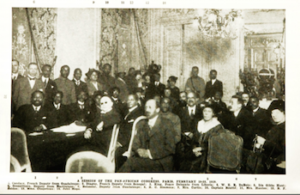
*The start of the Pan-African Congresses is celebrated on this date in 1919. The Pan-African Congress was a series of eight meetings from 1919 to 2014. They addressed the issues facing Africa because of the Berlin Conference.
The Pan-African Congress was a peacemaker. One of the group's significant demands was to end colonial rule and racial discrimination. It stood against imperialism, and it demanded human rights and equality of economic opportunity. The manifesto given by the Pan-African Congress included the political and economic demands of the Congress for a new world context of international cooperation. Colonial powers wanted native Africans to wait patiently for limited political concessions and better career opportunities. Because colonialism had been built on the foundation of capitalism, socialist ideas of equality and global collaboration appealed to these budding revolutionaries.
The 1st Pan-African Congress (1919) in Paris, France, was organized by W. E. B. Du Bois and Ida Gibbs Hunt. She acted as the primary translator at the Congress. There were 57 delegates representing 15 countries attending. Their main task was petitioning the Versailles Peace Conference held in Paris then. Among their demands were that:
· The Allied Powers should oversee the administration of former territories in Africa as a Condominium on behalf of the Africans living there.
· Africa is granted home rule, and Africans should take part in governing their countries as fast as their development permits until at some specified time in the future.
In 1921, the Second Pan-African Congress met in several sessions in London, Brussels, and Paris during August (28, 29, and 31) and September (2, 3, 5, and 6). As reported in The Crisis in November of that year, represented at this Congress were "26 different groups of people of Negro descent: namely, British Nigeria, Gold Coast, and Sierra Leone; the Egyptian Sudan, British East Africa, former German East Africa; French Senegal, the French Congo and Madagascar; Belgian Congo; Portuguese St. Thomé, Angola and Mozambique; Liberia; Abyssinia; Haiti; British Jamaica and Grenada; French Martinique and Guadeloupe; British Guiana; the United States of America, Negroes resident in England, France, Belgium and Portugal, and fraternal visitors from India, Morocco, the Philippines, and Annam."
There was an Indian revolutionary who took part, Shapurji Saklatvala, and a journalist from the Gold Coast named W. F. Hutchinson who spoke. This session of the Congress was the most focused on a change of all the meetings thus far. At the London session, resolutions were adopted, later restated by Du Bois in his "Manifesto To the League of Nations": If we are coming to recognize that the great modern problem is to correct maladjustment in the distribution of wealth, it must be remembered that the basic maladjustment is in the outrageously unjust distribution of world income between the dominant and suppressed peoples, in the rape of land and raw material, and the monopoly of technique and culture. And in this crime, white labor is particeps criminis with white capital. Unconsciously and consciously, carelessly, and deliberately, the vast power of the white labor vote in modern democracies has been cajoled and flattered into imperialistic schemes to enslave and debauch black, brown, and yellow labor.
The only dissenting voices were these of Blaise Diagne and Gratien Candace, French politicians. They soon abandoned the idea of Pan-Africanism because they advocated equal rights inside the French citizenship and thought the London Manifesto declaration too extreme.
In 1923, the Third Pan-African Congress was held in London and Lisbon. This meeting was unorganized. This meeting also repeated the demands such as self-rule, the problems in the Diaspora, and the African-European relationship. The following was addressed at the meeting:
· The development of Africa should be for the benefit of Africans and not merely for the profits of Europeans.
· There should be home rule and a responsible government for British West Africa and the British West Indies.
· The Abolition of the pretension of a white minority to dominate a black majority in Kenya, Rhodesia, and South Africa.
· Lynching and mob law in the U.S. should be suppressed.
Before the Congress met in London, the French Committee wrote a letter to Du Bois, telling him that the French group would not send delegates. However, in one of the reports he published in The Crisis, Du Bois drew on words spoken by Ida Gibbs Hunt and Rayford Logan to imply that the French Committee had sent delegates. As long-time African American residents of France, Hunt and Logan had traveled independently to the meeting. Hunt and Béton were perturbed that Du Bois had implied they represented France.
In 1927, The Fourth Pan-African Congress was held in New York City and adopted resolutions like the Third Pan-African Congress meetings.
The Fifth Pan-African Congress was held in Manchester, United Kingdom, October 15 – 21, 1945. The venue was decorated with the flags of Ethiopia, Liberia, and the Republic of Haiti. These three black nations were the only ones under self-governance at the time. The Lord Mayor of Manchester, Conservative Alderman W.P. Jackson, opened the Congress in the afternoon session. John McNair, secretary of the Independent Labor Party, also addressed Congress.
British-based organizations and activists dominated the Fifth Congress. It is viewed as the most significant, being held just months after the end of World War II. The War had been fought in the name of freedom; however, around the globe, millions of Africans and Afro-Diaspora populations lived under European colonial rule. Congress demanded decolonization and condemned imperialism, racial discrimination, and capitalism. The primary organizers were George Padmore, Dr. Peter Milliard, and T. Ras Makonnen.
Among the issues addressed at the Fifth Pan-African Congress conference were:
· "The Color Problem in Britain," including unemployment issues among black youth; abandoned mixed-race children fathered by black ex-servicemen and white British mothers; racial discrimination, the color bar, and discriminatory employment practices. These topics were discussed at the first session of the Congress held on October 15, 1945, chaired by Garvey.
· "Imperialism in North and West Africa ."All present demanded independence for African nations; delegates were split between the issue of having political emancipation first or control of the economy. Kwame Nkrumah advocated for revolutionary methods of seizing power as essential to independence. From this session onwards, the chair was taken by W. E. B. Du Bois.
· "Oppression in South Africa ."Including the social, economic, educational, health and employment inequalities Black South Africans face. All present expressed support and sympathy, which included several demands outlined.
· "The East African Picture ."Focusing on the issue of land, most of the best land had been occupied by white Europeans; working conditions and wages for Africans reflected the same inequalities as in South Africa. Jomo Kenyatta opened this session.
Discussing the issue of Britain exercising control over Ethiopia, the United Nations did not offer help to Ethiopia. At the same time, Italy (which conquered Ethiopia in 1935 under a fascist regime) received U.N. help. · "Ethiopia and The Black Republics."
· "The Problems in the Caribbean" This session was addressed by a few trade union delegates from the Caribbean; some representatives demanded "complete independence," some "self-government," and others "dominion status."

Women played an essential role in the Fifth Congress. Amy Garvey chaired the opening session, and Miss Alma La Badie, a Jamaican member of the Universal Negro Improvement Association, spoke about child welfare. Women were also supported in behind-the-scenes roles, organizing many social and other events outside the main sessions. Pan-Africanism aims at the African countries' economic, intellectual, and political cooperation. Even though Pan-Africanism as a movement began in 1776, it was the fifth Pan-African Congress that advanced Pan-Africanism and applied it to decolonize the African continent.
The 6th Pan-African Congress was hosted in Dar es Salaam, Tanzania, in June 1974. Black British activists attending the conference express the solidarity of the Black activists in Britain with anti-colonial activists in the rest of the world. A highlight of the meeting was the resolution on Palestine, which was the Congress' formal recognition of the right of the Palestinian people to self-determination.
The 7th Pan-African Congress was held April 3- 8, 1994, in Kampala, Uganda, coinciding with 'the dramatic changes to overturn white superiority in South Africa' (African Association of Political Science, 1996). The title of this Congress is 'Facing the Future in Unity, Social Progress and Democracy' and welcomes 800 delegates from pan-African organizations worldwide and some 2000 participants. Ali Mazrui led the panel regarding the 1993 Abuja Proclamation. Reparations were discussed.
A Pan Africanism of the people, the 8th Pan African Congress, held in Accra, Ghana, from March 4 – 7, 2015. It was a wake-up call to Africans interested in sustaining a wave of people-based Pan-Africanism. It also revealed deep crevices in the politics of the movement between the emerging voices of opportunism and those seeking the movement's rejuvenation. Opportunities were lost as the demand for generational change in leadership was disregarded by people hanging on to a mindset that is hostile to change and any generation of ideas.
Commemorations:
· Black Chronicles III: The Fifth Pan African Congress. Autograph ABP hosted the first exhibition showcasing John Deakin's photographs from the Fifth Congress. The exhibition marked the 70th anniversary of the Congress in 2015 and included film screenings exploring Pan-African history and ideals curated by June Givanni.
· "Pan African Congress 50 years on". The project was part of the 50th commemorative event held in Manchester in 1995. The project interviewed attendees of the 1945 Pan African Congress who were still living in Manchester in 1995.
· "PAC@75". Manchester Metropolitan University held a four-day celebration in October 2020 to mark the 75th anniversary of the 5th Pan-African Congress. Curated by Professor of Architecture Ola Uduku, the anniversary celebrations involved both creative and academic events. Archive material relating to 1945 and the celebratory events in 1982 and 1995 are held at the Ahmed Iqbal Ullah Race Relations Resource Centre at Manchester Central Library.
